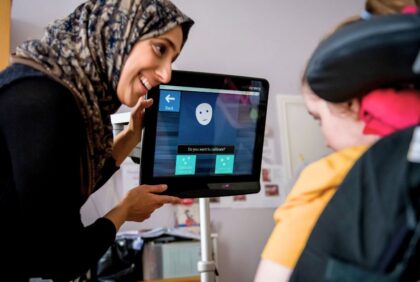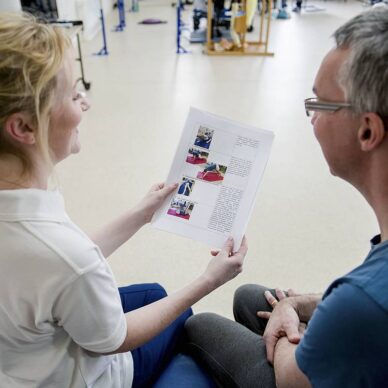
Understanding Your Needs
A brain injury could have involved coma, perhaps surgery for clotting, bleeding, or fractures. Aspects to be considered at pre-admission assessment, although the emphasis is on moving forward.
This can include improving core needs, such as walking, speaking, swallowing, bowel and bladder control. Broader areas of cognition, coordination, or memory may be affected.
Essential life skills can be forgotten, such as bathing, or cooking. Our occupational therapy team work with you to rebuild those skills.
Physiotherapists offer tailored care to build strength and coordination. Speech and language specialists can assist with being able to understand language, or to express yourself.
Neurological aspects play a part in assessment and recovery. To reinforce decisions on practical needs and plan the best way to relieve cognitive impairment through technology.
Interactive Therapy
Whilst our brain cells do not regenerate as such, the human brain is flexible and can reorganise, to regain lost ability.
Other areas of the brain take over the functions of damaged areas, as new pathways are established within undamaged brain cells. One of the best ways to achieve this is with digital therapy:
- MindMotionGO for virtual, game based exercise.
- Tyrosolution Pablo & Tymo to improve movement.
- Intento PRO, controlled electrical stimulation.
MindMotion GO offers a variable and engaging therapeutic environment. Encouraging users to continue, which helps to improve movement, standing, or sitting ability and cognition.
Other options have crossover effects, from correcting neurological conditions, to mapping and helping with mobility.
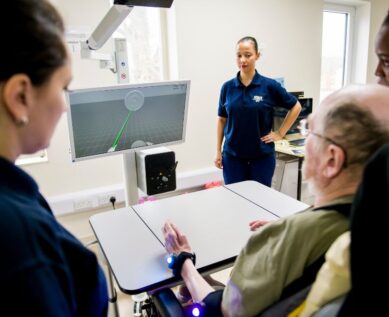
Interaction can be hands free
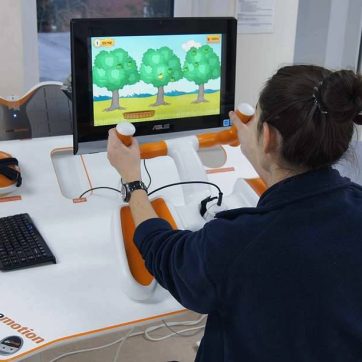
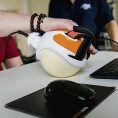
A Combined Approach
The latest technology has brought a paradigm shift in rehabilitative techniques. Not least by improving the level of intuitive control patients with brain injuries have.
Motivation is heightened and essential repetitive movements no longer feel repetitive, although skilled human input remains important.
Apart from training and direct support on equipment use, our team can make gradual adjustments as you improve. Customising and calibrating environments to bring further progress.
In the same way that our speech and language therapists might mix off and on screen elements, physical therapists meld the two options together. Exercises in a gym can compliment those in the virtual world.
Rather than provide a list of separate activities, a good rehabilitation programme will ensure they are each part of the same, personally designed programme.
Individual Support
From initially advising on an approach tailored to your needs, to seeing this become reality, the rehab team are there for you.
They are aware of the wide requirements brain injury rehabilitation can create. From improving thinking processes, to coping physically and relearning essential skills.
Therapy can be intensive and tiring, as you encourage your brain to find new ways of working. Staff develop a rapport with you, helping them to be aware of times a little extra support is required.
Alongside being skilled professionals, they are people and share your wish to see change. Your choices and ambitions become their motivation, to find ways to make them reality.
Whether a brain injury is recent, or more historic, progress can be made. Through a combination of your determination, modern technology and knowledgeable support.
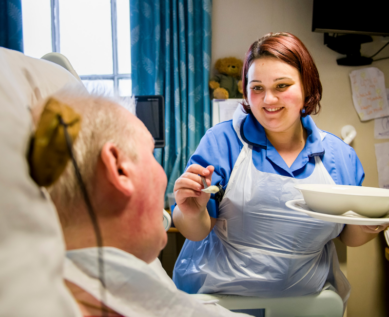
Controlled exercise helps
Our Facilities
Our patients and the people who care for them deserve the finest facilities, to ensure effective rehabilitation.
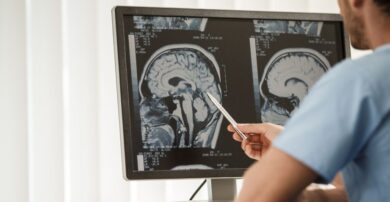
An adjacent hospital
The Royal Bucks rehabilitation centre is separate, although having our hospital in the same building can be helpful. A state of the art facility, with around 60 consultants covering every aspect of medicine.
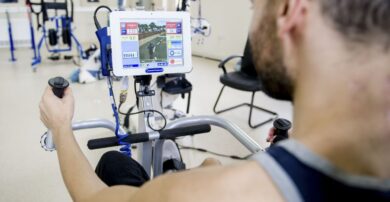
Advanced technology
Our centre is amongst the best equipped in Europe, with an anti-gravity facility based on NASA designs, varying types of exoskeleton, laser therapy and high tech aids for neurological rehabilitation.
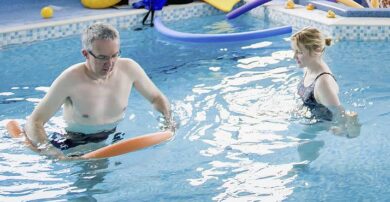
Hydrotherapy pool
An 8.5 metre pool heated to 34 centigrade, with resistance jets for exercise and a jet massage. The pool provides accessibility for all, with slides and hoists built in and is supported by experienced staff .
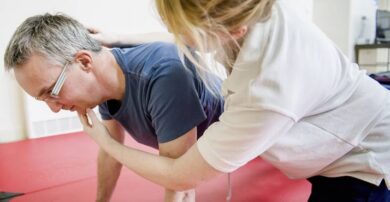
Skilled Physiotherapy
Physiotherapy is recognised for the value this is able to bring after trauma, or surgery. Where longer term conditions apply, our physios are leaders in the field and play an important role in recovery.
Speak to our team today
Get in touch to book an appointment, for further information, or to ask any question you wish. All contact is handled securely and confidentially.
Call us on
01296 678800
Email us
enquiries@royalbucks.co.uk
"*" indicates required fields
